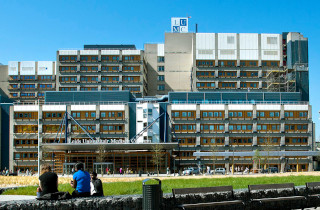Researcher Implementation FAIR Principles for Personal Genetic Lockers
Researcher Implementation FAIR Principles for Personal Genetic Lockers
You cannot apply for this job anymore (deadline was 3 Nov 2019).
Browse the current job offers or choose an item in the top navigation above.
Job description
As a researcher, you will contribute to defining scientific goals within FAIR implementation projects. You will have a leading role in the group’s research and development of FAIR-based computational knowledge discovery on rare and genetic diseases, particularly for the development of the ‘personal genetic locker’ within the ‘personal health train’ paradigm. You will focus on research and development of semantic models, procedures and software services for implementing FAIR principles. Furthermore, you will coordinate local and international team work towards timely delivery of milestones, deliverables, and scientific output (e.g. as task/work package lead). You will also write publications and grant proposals, sometimes in a leading role and focus on the dissemination of group results. In addition, you will participate in international organisations for the development of standards for semantic interoperability, and advise the group and its collaborators on international state-of-the-art standards. To this end, you will also attend project meetings, and take the lead on project tasks where needed.
Specifications
- max. 36 hours per week
- max. €5226 per month
- LEIDEN View on Google Maps
Requirements
We are looking for an experienced academic research who has knowledge of and experience with Linked Data, Semantic Web, and ontological modelling. You are also familiar with standards for knowledge representation of biological and medical data. You are experienced with knowledge-based analysis, AI and machine learning, and designing and specifying software services. You have affinity with translational research on rare and genetic diseases. You are well able to manage research projects and collaborate in a multidisciplinary setting. You can train juniors and non-technical collaborators. Thus, you are highly communicative and social.
Summary of the required skills
· You are an experienced researcher with an interest in translational research on rare diseases
· You are familiar with standards for knowledge representation for biological and medical data
· You are experienced with knowledge-based analysis and software design and specification
· You also have experience with scientific management and multidisciplinary collaborations
· You are able to take a leading role in research, collaborations and training
Conditions of employment
You will be employed on the basis of 36 hours per week. Appointment is for a minimum of 1 year, possibly to be extended up to three years Your salary is based on your education and experience and is a maximum of € 5,226 gross per month for a full time position (scale 11 in the Collective Labour Agreement for University Hospitals).
Employer
At the Leiden University Medical Center, we continuously work on improving patient care. We invest in groundbreaking, international research and work with the latest equipment. Together with our team of doctors, medical specialists, teachers, academic researchers and supporting staff, we aim for the best quality in health care, education and international research. And we need you to realize our goals!
Department
Department of Human Genetics
You will work in the Biosemantics group of the LUMC, which is part of the Department of Human Genetics. The research of the group focuses on knowledge-based data analytics on rare and genetic diseases, and implementation of FAIR data principles to create better substrates for translational research. As initiator and one of the founders of the FAIR data principles, the group is active on the forefront of international research on their implementation. A prime focus is interoperability and machine readability using knowledge representation techniques and semantic web technologies. The approach is to develop generic solutions for specific applications, mostly in the rare disease domain. The group embraces ‘learning by doing’ with collaborators in the Human Genetics department, and other academic hospitals, patient organisations, and international projects and organisations.
Specifications
- Research, development, innovation
- Health
- max. 36 hours per week
- max. €5226 per month
- University graduate
- D.19.MH.RD.02
:fill(white)/logos/lumc-en-wide.png)
